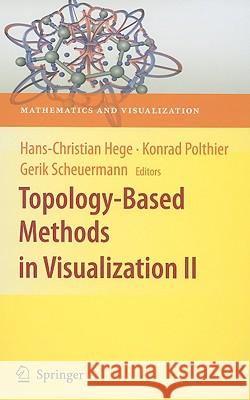Topology-Based Methods in Visualization II » książka
Topology-Based Methods in Visualization II
ISBN-13: 9783540886051 / Angielski / Twarda / 2008 / 200 str.
Visualization research aims to provide insight into large, complicated data sets and the phenomena behind them. While there are di?erent methods of reaching this goal, topological methods stand out for their solid mathem- ical foundation, which guides the algorithmic analysis and its presentation. Topology-based methods in visualization have been around since the beg- ning of visualization as a scienti?c discipline, but they initially played only a minor role. In recent years, interest in topology-basedvisualization has grown andsigni?cantinnovationhasledto newconceptsandsuccessfulapplications. The latest trends adapt basic topological concepts to precisely express user interests in topological properties of the data. This book is the outcome of the second workshop on Topological Methods in Visualization, which was held March 4-6, 2007 in Kloster Nimbschen near Leipzig, Germany.Theworkshopbroughttogethermorethan40international researchers to present and discuss the state of the art and new trends in the ?eld of topology-based visualization. Two inspiring invited talks by George Haller, MIT, and Nelson Max, LLNL, were accompanied by 14 presentations by participants and two panel discussions on current and future trends in visualization research. This book contains thirteen research papers that have been peer-reviewed in a two-stage review process. In the ?rst phase, submitted papers where peer-reviewed by the international program committee. After the workshop accepted papers went through a revision and a second review process taking into account comments from the ?rst round and discussions at the workshop. Abouthalfthepapersconcerntopology-basedanalysisandvisualizationof ?uid?owsimulations;twopapersconcernmoregeneraltopologicalalgorithms, while the remaining papers discuss topology-based visualization methods in application areas like biology, medical imaging and electromagnetism.











